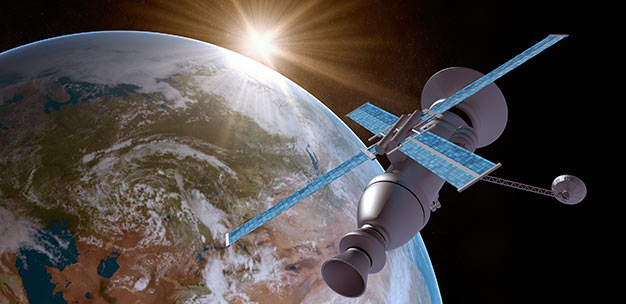A new legal field has sprung up to regulate humanity's ever-growing activities in outer space
Published online 6 March 2015

Space has great potential to benefit humankind, but judicious regulation is needed to facilitate the utilization of space.
© koto_feja/iStock/Thinkstock
Traffic police are not issuing speeding tickets in space, but the long arm of the law is far from absent in the 'final frontier'. A fast-growing body of national and international laws, known as space law, is now being used to regulate human activities in outer space, and Keio University is at the forefront of this young but increasingly important field.
In January 2012, the university, in collaboration with the Japan Aerospace Exploration Agency (JAXA), established the Institute of Space Law, which aims to examine and offer legal solutions to issues arising from space activities, as well as foster and enhance research in the field of space law in Japan and countries across Asia. The center also runs a space law master's program. "It is the only institute of its kind in Japan and one of only about a dozen in the world," says Setsuko Aoki, a professor at the center.
Space exploration
Space activities have grown rapidly through large international space missions and satellites for communication, scientific research, espionage and remote sensing. Technology that relies on these activities is fast becoming a normal part of life ― we use it every time we check our position on a navigation device or view a sports event screened on satellite television. Even space tourism is close to becoming a reality.
"Space is potentially very beneficial to humankind and can help us overcome many of the problems we face today," says Aoki, who became enamored with the field while studying law in Canada.
Examples of the benefits of space include the use of satellite data to combat infectious diseases and predict ozone depletion, she says. But legislation is needed to manage these inherently dangerous activities. "Space law can act as a vital facilitator for reducing risk and to cover compensation issues that arise when accidents do occur," Aoki explains.
For Aoki, the field offers an appealing mix of international relations and science, such as calculating satellite orbits. Space law covers the financing of off-planet enterprises, insurance, navigation, export control, security, intellectual property protection and more. It also encompasses international politics, as typified by the Outer Space Treaty brokered by the United Nations. About 100 countries are parties to this treaty, which was produced in 1967.
Debris damage and militarization
Keio is researching aspects of space law that particularly affect Japan, such as the problem of space debris. NASA tracks over half a million pieces of debris orbiting the Earth, of which more than 2,000 are larger than a softball. According to Aoki, the Japanese satellite operator SKY Perfect JSAT Corporation has to adjust the orbits of its 16 satellites almost daily to dodge space debris hurtling toward them. Regulations are now in place that assign responsibility for damage caused by debris whose source is known, while non-legally binding guidelines stipulate ways to minimize the generation of new debris.
A more sinister aspect of space law is the militarization of space, particularly anti-satellite attacks. This area has become especially urgent since the anti-satellite missile tests conducted in 2007 by China, which involved the physical destruction of a Chinese satellite and generated thousands of pieces of trackable space debris. International treaties such as the Outer Space Treaty limit the deployment of weapons of mass destruction in space, and are expected to become increasingly important in preventing an arms race in space as technology advances.
The year 2015 is particularly important for space science in Japan as the Japanese government will begin to adopt national space laws in compliance with the Outer Space Treaty. "About 20 countries have already created such laws, and now it is Japan's turn," explains Aoki. She and other members of the Center for Space Law will be contributing to this process through their participation in various guiding committees. Thus, the center will be playing a major role in shaping space law policy in Japan. "This is a really exciting time to be active in this developing field," says Aoki.